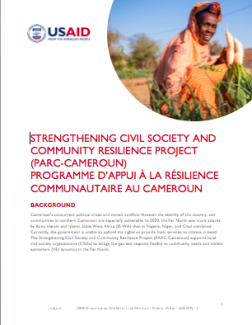Cameroon’s concurrent political crises and violent conflicts threaten the stability of the country, and communities in northern Cameroon are especially vulnerable. In 2020, the Far North saw more attacks by Boko Haram and Islamic State-West Africa (IS-WA) than in Nigeria, Niger, and Chad combined. Currently, the government is unable to uphold the rights or provide basic services to citizens in need. The Strengthening Civil Society and Community Resilience Project (PARC-Cameroun) supports local civil society organizations (CSOs) to bridge the gap and respond flexibly to community needs and violent extremism (VE) dynamics in the Far North.
EMPOWERING CAMEROONIANS TO ADDRESS THEIR NEEDS
To achieve its goal of collaborating with Cameroonians for increased advocacy and access to service provision, PARC-Cameroun builds the capacity of strategic partners and supports CSOs to represent and serve their constituencies more effectively.
INCREASING CSOs’ ACCESS TO SERVICE AND STRENGTHENING THEIR ADVOCACY
PARC-Cameroun strengthens the collective performance of CSOs to advocate for citizen rights and service provision, address the issues of marginalization of women and youth, and collectively respond to the restricted civic space in, and stigmatization of, northern communities. PARC-Cameroun works with strategic partner organizations to strengthen their performance through a capacity building approach that emphasizes performance improvement over the production of outputs; continual mentoring and coaching instead of one-size-fits-all training; and peer-to-peer networking and exchange over expert-led direction. Throughout the life of the project, PARC-Cameroun will support the 30 SPs through an 18-month program of mentoring, training, and learning initiatives, as well as continued networking and advocacy activities.
SUPPORTING CSOs TO EFFECTIVELY SERVE THEIR CONSTITUENCIES
Disrupted services and livelihoods ultimately contribute to weakened social cohesion and the exploitation of community vulnerability by VEOs. PARC-Cameroun responds to these issues by supporting community-led solutions through the Community Capacities for Resilience (CC4R) process. Through the CC4R process, local CSOs engage their communities in collectively undertaking a transformative process to:
- Analyze local dynamics;
- Increase their capacity to engage women, youth, and other marginalized populations;
- Generate community solutions; and,
- Fill urgent service-delivery gaps.
Local actors will design, iterate, initiate, and implement solutions that are fit for the context and for local drivers, dynamics, and factors of resilience and adapt their solutions in response to learning and to changes in conflict and VE dynamics.
Program Information
Goal: Collaborate with Cameroonians for increased advocacy and access to service provision.
Life of Program: March 2022 – March 2027
Total USAID Funding: $11 million
Geographic Focus: Cameroon
Implementing Partner: FHI 360

